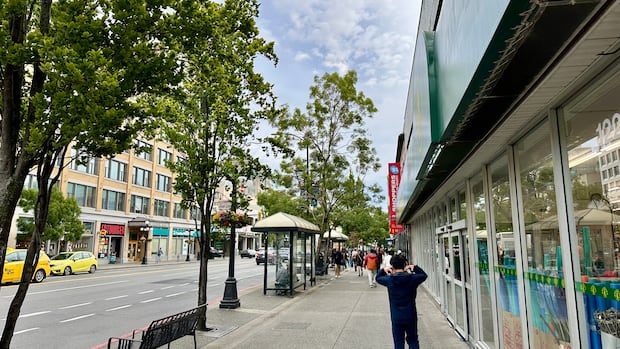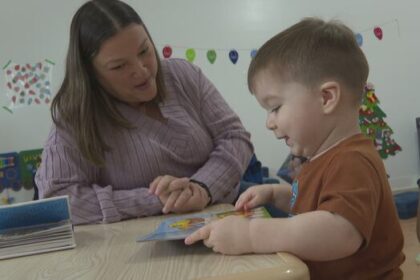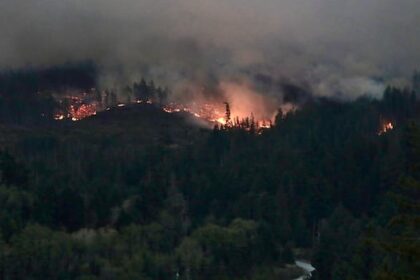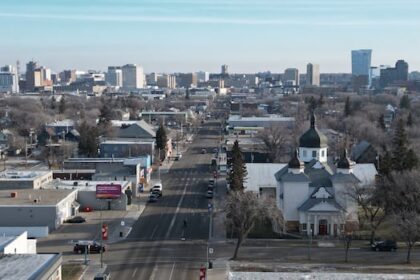British ColumbiaVictoria committed over $10 million for the first phase of its plan to address public concerns about safety and social disorder. The work includes more police and bylaw officers downtown, and new housing partnerships.The city has accomplished 2 of its 11 priorities since the project began in July Kathryn Marlow · CBC News · Posted: Nov 21, 2025 9:46 PM EST | Last Updated: 4 hours agoListen to this articleEstimated 4 minutesThe audio version of this article is generated by text-to-speech, a technology based on artificial intelligence.Earlier this year, some Victoria business owners said they were losing customers because people felt unsafe downtown — but now, they say they’re seeing improvements. (Kathryn Marlow/CBC) The City of Victoria has completed two of the 11 priorities in its Community Safety and Wellbeing plan, and people are starting to see an effect — but it’s not working for everyone. The plan, which was released earlier this year to address public concerns about safety and social disorder, contains over 100 recommendations covering needs such as housing, healthcare, policing and bylaw enforcement. In July the city committed $10.35 million for the first wave of the program.Jeff Bray, executive director of the Downtown Victoria Business Association (DVBA), told city council on Thursday his members are happy with the progress so far. The DVBA reported earlier this year that nearly half its members surveyed said they’d consider closing their businesses if they weren’t tied to their lease, citing street disorder and shoplifting among their concerns — as well as parking. But now, Bray said, members are telling him they’re seeing more police and bylaw officers, and less street disorder. “That has had a direct, positive impact in many areas downtown,” Bray told council. One of the city’s two completed priority actions includes matching provincial funding for a policing initiative called C-STEP (Community Safety & Targeted Enforcement Program). The city has contributed $220,000 to the program, which is designed to address non-violent street crimes such as theft and property damage.Pandora AvenueThere has also been a focus on “cleaning up” three downtown blocks, where people who are unhoused congregate — including the much-discussed 900-block of Pandora Avenue, which is just east of the core downtown business district. City staff told council that teams of community service providers, police, and bylaw officers are visiting the area four to six times a week. Simon Ralph, who lives on Pandora Avenue, has certainly noticed their increased presence. Ralph says he’s had his belongings taken away by bylaw officers on multiple occasions — sometimes just after he’s replaced them. Simon Ralph is unhoused and lives on Pandora Avenue in Victoria, B.C. (Kathryn Marlow/CBC)This week he was in the hospital with pneumonia, and when he was discharged he returned to Pandora only to have his shopping cart full of belongings taken away. “There’s just nowhere to go,” said Ralph, who said he has not been offered any housing. While discussing the plan’s progress report, staff and several city councillors noted the plan is not just about enforcement. Kerrilee Jones, assistant director of community safety and bylaw services, said there is a team of people who connect with both businesses and people who are unhoused, and work with service providers as well. “We are looking to seek assistance for people, prior to enforcement,” Jones told council. Enhanced emergency weather plan also complete The other completed priority is an enhancement of the city’s emergency weather response plan: in addition to offering overnight shelter beds and a warming centre during extreme weather, the city will provide support for warming tents and buses and provide “stay warm, stay dry”-kits to be distributed to unhoused people. According to a staff report, the tents and buses have been added because it was difficult for people who are unhoused to access the warming centre provided at the Cook Street Village Activity Centre last year, especially because there was limited space for their personal belongings. The city says it’s already acting on its nine remaining priorities, including hiring additional bylaw officers (with four hired so far), establishing new housing and shelter options (including just-announced housing for people who are sober), and increasing support for community service providers.The next progress report is expected in January. ABOUT THE AUTHORKathryn Marlow is a reporter for CBC Victoria, and the host/producer of the podcast This is Vancouver Island. She covers stories in greater Victoria, and across the whole Vancouver Island region. You can reach her at kathryn.marlow@cbc.ca.
Victorias community safety plan is working for some but not all











